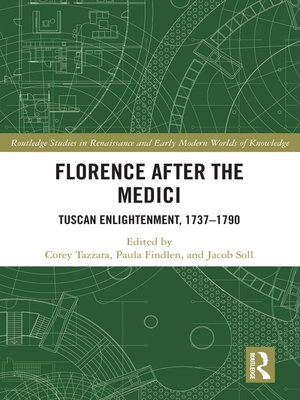Florence After the Medici
ebook ∣ Tuscan Enlightenment, 1737-1790 · Routledge Studies in Renaissance and Early Modern Worlds of Knowledge
By Corey Tazzara

Sign up to save your library
With an OverDrive account, you can save your favorite libraries for at-a-glance information about availability. Find out more about OverDrive accounts.
Find this title in Libby, the library reading app by OverDrive.



Search for a digital library with this title
Title found at these libraries:
| Library Name | Distance |
|---|---|
| Loading... |
Although there is a rich historiography on Enlightenment Tuscany in Italian as well as French and German, the principle Anglophone works are Eric Cochrane's Tradition and Enlightenment in the Tuscan Academies (1961) and his Enlightenment Florence in the Forgotten Centuries (1973). It is high time to revisit the Tuscan Enlightenment. This volume brings together an international group of scholars with the goal of putting to rest the idea that Florence ceased to be interesting after the Renaissance. Indeed, it is partly the explicit dialogue between Renaissance and Enlightenment that makes eighteenth-century Tuscany so interesting. This enlightened age looked to the past. It began the Herculean project of collecting, editing, and publishing many of the manuscripts that today form the bedrock of any serious study of Dante, Petrarch, Boccaccio, Machiavelli, Vasari, Galileo, and other Tuscan writers. This was an age of public libraries, projects of cultural restoration, and the emergence of the Uffizi as a public art gallery, complemented by a science museum in Peter Leopold's reign whose relics can still be visited in the Museo Galileo and La Specola.







